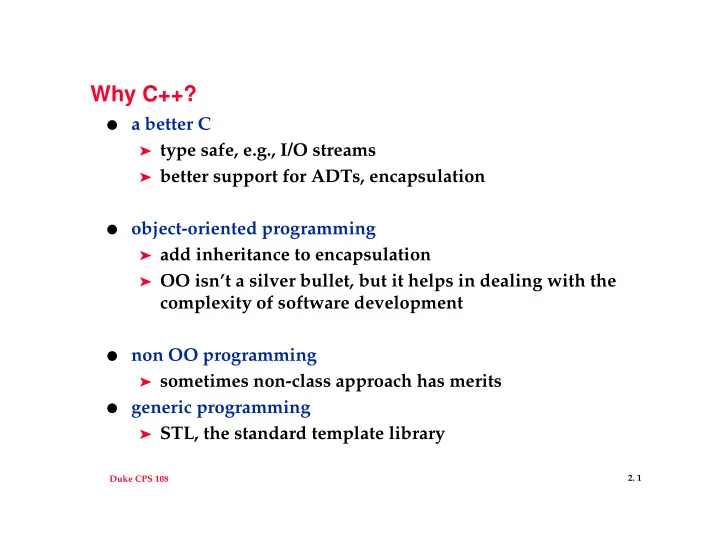

Why C++? ● a better C ➤ type safe, e.g., I/O streams ➤ better support for ADTs, encapsulation ● object-oriented programming ➤ add inheritance to encapsulation ➤ OO isn’t a silver bullet, but it helps in dealing with the complexity of software development ● non OO programming ➤ sometimes non-class approach has merits ● generic programming ➤ STL, the standard template library 2. 1 Duke CPS 108
Why inheritance? class Shape standard shape example ● { ➤ difficult to extend public: enum Kind {circle,square,...}; ➤ access to source double area() const; ➤ change all functions void rotate(); private: ➤ what is state? Kind myKind; }; double Shape::area() const inheritance ● { switch (myKind) ➤ models is-a { case Shape::circle: Liskov substitution principle return PI * myDim * myDim; ➤ cost? (who pays?) case Shape::square: //... } } 2. 2 Duke CPS 108
Inheritance ● virtual functions provide runtime polymorphism ➤ must use pointers or references ➤ can extend base class without access to source ● in C++ there are several kinds of inheritance ➤ public, private, virtual, ... ➤ multiple inheritance ● we’ll use single, public inheritance, trying to model “is-a” as much as possible ● General goal: base classes are abstract , have one pure virtual function ➤ model an interface, not an implementation ➤ see roulette program for example, also map hierarchy 2. 3 Duke CPS 108
shapes: C++ features, what is “is-a”? class Shape { public: virtual double area() const = 0; }; class Square : public Shape { public: virtual double area() const {return mySide * mySide;} private: double mySide; }; class Rectangle : public Shape { public: virtual double area() const {return myWidth * myHeight;} }; 2. 4 Duke CPS 108
Designing for change (extension) ● How does inheritance help? ● What about different table formats in hyperwag? ➤ is more than one layout possible? problems? if (headerStyle == normal) ... else if (headerStyle == gaudy) ... else if ... ● factory pattern helps here ➤ abstracts object creation, multiple look-and-feel ➤ can use factory for reading format, writing format, ... 2. 5 Duke CPS 108
Factory Pattern ● Consider classes for different look-and-feel styles NormalLayout wagNL; wagNL.makeHeader(); GaudyLayout wagGL; wagGL.makeHeader(); ➤ problems, how to choose styles, when to choose ● Does inheritance help? (assume ABC , Layout) Layout * wag = new NormalLayout; Layout * wag = new GaudyLayout; wag->makeHeader(); ➤ is this better? are there problems? ● Use a Layout Factory Layout * wag = factory->makeLayout(); wag->makeHeader(); ➤ dependencies exist, but in factory ➤ parameters to factory can set the look-and-feel returned 2. 6 Duke CPS 108
Design patterns ● Add to vocabulary we use to communicate and think about design ● Form part of a tool-kit we use when thinking about design ● Help find solutions to design problems ➤ factory ➤ iterator see usewords.cc ➤ proxy ➤ also: adapter, singleton, observer, command ➤ also: model-view-controller, client-server, … ➤ GOF, gang-of-four, Gamma, Helms, Johnson, Vlissides ➤ we’re using Buschmann et al 2. 7 Duke CPS 108
usewords.cc ● iterators ➤ internal, external ➤ creation/deletion ➤ use of inheritance and naming conventions ● STL, Duke-classes ➤ what is a templated class/function? ➤ how are templates instantiated? ➤ drawbacks? 2. 8 Duke CPS 108
Data Structures, STL, Generic Programming ● common container classes/data structures ➤ vector growable array ➤ map dictionary, (seach tree, hashtable) ➤ set union, intersection, membership ● STL, Standard Template Library ➤ not just implemenations, but way of thinking ➤ little/no inheritance, lots of templates ➤ algorithms and functions generalized too ● default often not-safe, implementations make heavy use of “new C++ features” 2. 9 Duke CPS 108
Thinking about thinking about hyperwag ● issues in specification ➤ ambiguities ➤ missing pieces ● classes: nouns; member functions: verbs ➤ what, not how ➤ responsibilities and collaboration among classes ● other design/problem questions? 2. 10 Duke CPS 108
Designing Classes and Programs ● Where do classes come from? ➤ nouns: brainstorm, cull, combine, divide ➤ attributes vs. classes, keep cohesion high ● Things to watch out for ➤ kitchen sink classes: keep classes highly cohesive ➤ God classes: know about everything in the app ➤ classes with little behavior (only get/set), and few collaborators ● CRC cards: classes, responsibilities, collaborators ➤ 3x5 card, class name at top, list responsibilities and collaborators 2. 11 Duke CPS 108
CRC card template Class name subclasses/superclasses responsibilities collaborators WagReader (abstract) parseStream Appointment getAppointment? Stream iterators? WagMaker ... ... Other classes in hyperwag? 2. 12 Duke CPS 108
working in groups/teams ● work together/debate the design, don’t code until the design is understood by everyone ➤ what about initial hyperwag prototype? ➤ Doom: Design and implementation are iterative processes ● what about controlling the source code, building the program? ➤ use RCS or CVS, start now (hopefully CVS soon, see web) ➤ build/make everyday, versions ok, a working program is a wonderful thing ➤ who’s in charge? 2. 13 Duke CPS 108
Brooks’ team (see chapter 3, Mythical Man Month ) ● surgeon, chief programmer ● copilot ● administrator ● editor ● program clerk ● toolsmith ● tester ● language lawyer ● secretaries (2) ➤ necessary? what about three-person teams 2. 14 Duke CPS 108
Other team formats ● Everyone participates in design ● Everyone codes ● Someone has to be in charge ● What about different views, levels of experience? ● What can be done when someone doesn’t deliver? ● How to live with the team (or not) ● What’s the best way to get everyone to help? ● Don’t leave anyone behind, don’t get left behind 2. 15 Duke CPS 108
Recommend
More recommend